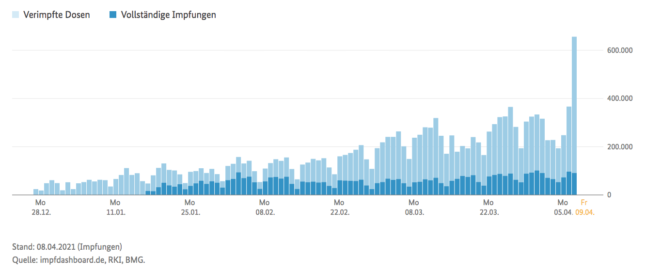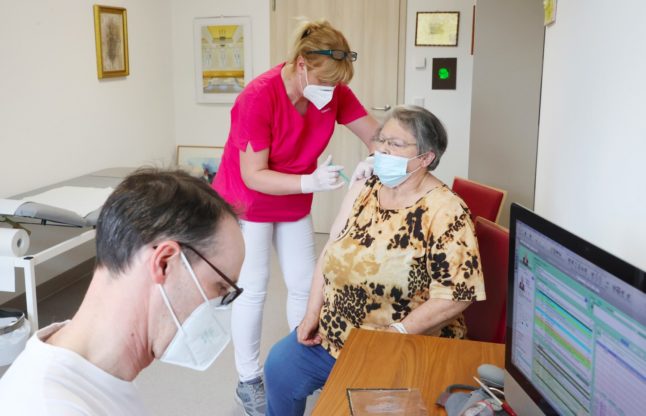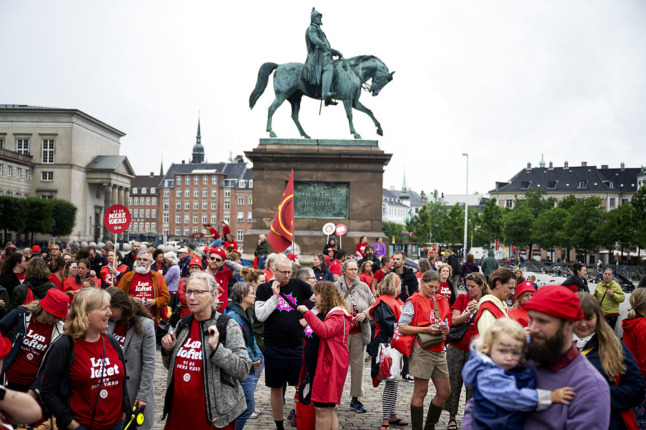On Wednesday, around 656,000 doses were administered to people in Germany – 290,000 more than the day before, according to the Robert Koch Institute (RKI).
This week around 35,000 GP surgeries have started vaccinating patients across Germany’s states, helping to boost the speed of the inoculation campaign.

This graphic by the RKI shows the major increase in vaccinations within a day in Germany. The light blue shows people who’ve had one shot and the dark blue means both doses or fully vaccinated.
More supplies of coronavirus vaccines have also been arriving since the beginning of April.
Up until this point, no more than 367,000 vaccine doses had been administered in Germany on any given day.
In total, 16.26 million vaccine doses have been administered since the start of the rollout at the end of December. Almost 14 percent of residents in Germany have received one dose – up from 13 percent the day before. Almost six percent of the population has received both doses.
READ ALSO: Germany’s GPs begin vaccinating patients against Covid-19
some good news in Germany's vaccine campaign!
Over 650 thousand people were vaccinated yesterday, more than a double the previous day and beating the UK's daily record. pic.twitter.com/96seV6URU1
— James Jackson (@derJamesJackson) April 8, 2021
What’s the situation across states?
There are still large differences in vaccination progress between the federal states.
The front-runner is Bremen, where 16.5 percent of the population has been given one dose.
This is followed by Saarland (15.9 percent have had one dose), Schleswig-Holstein (15.8 percent), Brandenburg (15.5 percent), Thuringia (15 percent), Saxony-Anhalt (14.6 percent), Rhineland-Palatinate (14.3 percent), Berlin (14 percent) and Bavaria (13.9 percent).
The most populous state, North Rhine-Westphalia, was able to improve its ranking after the start of vaccinations among GPs and is now at the national average of 13.8 percent.
It is followed by Hamburg (13.7 percent), Baden-Württemberg (13.4 percent), Lower Saxony (13.3 percent), Hesse (13 percent), Saxony (12.8 percent). Mecklenburg-Western Pomerania, with 12.5 percent, is the state with the lowest percentage of vaccinated residents in Germany.
READ ALSO: GPs in Germany call for vaccines to be given according to health not age
Initially, only a small supply of doses is available to family doctors. In the first week, all practices together will receive 940,000 vaccine doses a week.
That amounts to about 26 doses per practice per week. In the week of April 26th, however, there will be a significant boost to resources – and at that point GPs can expect a total of more than three million doses each week.
Germany has been criticised for a sluggish vaccination programme met with supply shortages and an ongoing controversy over the use of the AstraZeneca jab. Spahn previously promised that as many vaccines would be carried out in April as during the first quarter of the year.



 Please whitelist us to continue reading.
Please whitelist us to continue reading.
Finally, the engine is running!
On Monday April 12th, the UK will have reached herd immunity against Covid-19. On the same day, Germany celebrates allowing GP’s to vaccinate 26 people per week and potentially heads into a sixth month of lockdown. #thirdworld.
I cant have flu or pneumonia jabs so I won’t be getting this one. Nobody knows what the long term effects are of these g.t “vaccines that have been produced in such a short time. Also people who have had them have been told they still have to wear masks and socially distance and that they can still spread the virus. They are being told its so they dont get very sick and end up in ITU.
Finally some good news, but I still believe that people should be automatically informed when they are eligible for the first Dose, & where, so they can make an appointment. At the moment it feels like you need to keep ringing your Doctor, or some mysterious number, just to even find that out! I mean we are all registered at a particular address with D.O.B. noted, so they can easily find us!